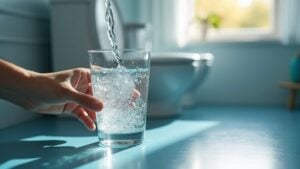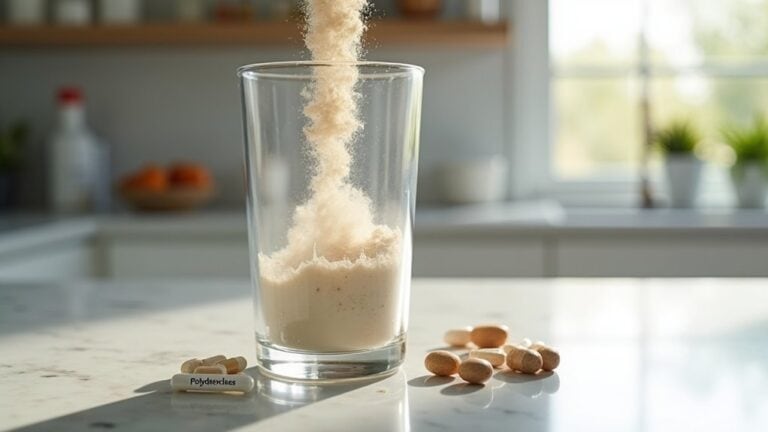Ever notice how drinking water seems to send you straight to the bathroom? Should you be peeing a lot after hydrating, your kidneys are just doing their job—filtering excess fluid and keeping your body balanced. Drinking too fast can stretch your bladder, making you feel the urge sooner. But frequent urination isn’t always just about water; things like caffeine, medications, or even health conditions like diabetes can play a role. Curious what else could be behind it?
The Role of Kidneys in Urine Production
Every day, your kidneys filter around 120 to 150 quarts of blood just to remove waste and keep your body balanced.
They adjust urine production based on your water intake, ensuring proper fluid balance.
Tiny nephrons in your kidneys reabsorb water or let it pass into urine, depending on your needs.
Drink more, and they’ll make more urine—it’s their way of keeping everything in check.
How Hydration Levels Affect Urination Frequency
Whenever you drink a lot of water, your body needs to balance things out—and that’s why you could find yourself running to the bathroom more often.
Higher hydration levels mean your kidneys filter extra fluid, filling your bladder faster. Should your fluid intake spike suddenly, frequent urination follows as your body flushes out what it doesn’t need.
Staying hydrated is key, but pace yourself to avoid overwhelming your bladder.
Impact of Caffeine and Alcohol on Urination
Caffeine and alcohol both make one pee more because they act as diuretics, pushing your kidneys to release extra fluid.
Should you drink coffee or beer, you may notice your bladder gets irritated, making trips to the bathroom feel more urgent.
Balancing these drinks with water helps prevent dehydration and keeps your system running smoothly.
Diuretic Effects Explained
Should you’ve ever noticed you’re running to the bathroom more after a cup of coffee or a beer, it’s not just in your head—both caffeine and alcohol mess with your body’s water balance.
Caffeine’s a diuretic, meaning it tricks your kidneys into flushing extra fluid, boosting urination.
Alcohol blocks a hormone that helps you retain water, so you lose more than you take in.
Stay hydrated to counter it.
Bladder Ir Factors Factors
You could’ve noticed that after a few cups of coffee or a couple of beers, your bathroom trips become way more frequent. Caffeine and alcohol are diuretics, making your kidneys produce more urine. Drinking a lot of these can irritate your bladder, leading to concentrated urine and bladder problems. Here’s how they compare:
| Caffeine | Alcohol |
|---|---|
| Increases urine output by 30-50% | Suppresses vasopressin, causing dehydration |
| Triggers urgency even in small amounts | Leads to concentrated urine, irritating the bladder |
| Speeds up kidney filtration | Can worsen frequent urination over time |
| might cause temporary bladder sensitivity | Often results in drinking a lot, then peeing a lot |
Hydration Balance Tips
Since both caffeine and alcohol mess with your body’s fluid balance, managing your hydration wisely can make a big difference in how often you hit the bathroom.
These diuretics can worsen frequent urination, so limit them—especially with high water intake.
Space out caffeinated or alcoholic drinks with plain water to support bladder health. Staying mindful of your hydration balance helps reduce bathroom trips without cutting fluids entirely.
Physical Activity and Temperature Influences
As you exercise, your body could produce more urine because it’s working to clear excess fluids and waste.
Heat and sweating can make you lose water quickly, so your kidneys could hold onto fluids until you rehydrate.
Once you drink enough, you’ll observe a spike in urination as your body balances itself out again.
Exercise Increases Urination
Though exercise is great for your body, it can mess with your bathroom habits.
Whenever you work out, your body juggles hydration, fluid intake, and urine production in surprising ways. Here’s why:
- Sweat steals fluids—Your body prioritizes cooling over peeing, so you may not urinate much during exercise.
- Post-workout catch-up—After resting, your kidneys flush out extra water, leading to frequent urination.
- Hydration balance—Drinking too much post-exercise can overload your system, making you pee more.
Stay mindful of your fluid intake!
Heat Affects Fluid Loss
Exercise isn’t the only thing that affects how often you pee—heat plays a big role too.
As temperatures rise, your body loses fluid through sweat, leaving less for urine. You could feel thirstier and drink more, but your kidneys might hold onto water to prevent dehydration.
In case you’re active in the heat, hydration becomes even trickier—watch for signs like dark urine or dry mouth.
Diabetes and Frequent Urination Connection
In case you’ve noticed that drinking water sends you running to the bathroom more than usual, diabetes could be playing a role.
Here’s how it works:
- High blood sugar forces your kidneys to work overtime, pulling extra glucose into your urine, which drags water with it.
- Poor hydration balance happens because your body struggles to hold onto fluids as sugar levels spike.
- Frequent urination becomes a red flag—your body’s way of signaling unstable blood sugar.
If this sounds familiar, it’s worth checking with a doctor.
Medications and Supplements That Increase Urination
Should diabetes not be behind your frequent trips to the bathroom, certain meds or supplements could be.
Diuretics, or water pills, boost urine output by flushing excess fluid—common for high blood pressure.
Some antidepressants or hormone therapies also ramp up urinary frequency.
Even caffeine-heavy supplements act like natural diuretics, making you pee more.
Check your meds—they could be the sneaky culprit behind your extra bathroom breaks.
Bladder Health and Sensitivity to Fluid Intake
- An overactive bladder might trigger urges even with slight fullness.
- Diluted urinary concentration from excess water can increase urgency.
- Bladder irritants or weak pelvic muscles heighten sensitivity.
Listen to your body and adjust fluid intake wisely.
Pregnancy and Hormonal Effects on Urination
Pregnancy brings a flood of changes to your body, and frequent trips to the bathroom are often one of the initial signs.
Hormonal changes, like rising progesterone, make your bladder more sensitive, while your growing uterus presses on it, increasing urination frequency.
Extra blood flow also means more fluid gets filtered by your kidneys.
You may notice nighttime urges too—thanks to these shifts, your bathroom visits just multiply.
Conclusion
So, now you know—should you be peeing a lot after drinking water, your kidneys are just doing their job. But when it feels like you’re running to the bathroom every five minutes, try slowing down your sips or checking for other sneaky causes (like caffeine or meds). Recall, balance is key; don’t throw the baby out with the bathwater by cutting back on hydration entirely. Listen to your body, and you’ll find your sweet spot!





